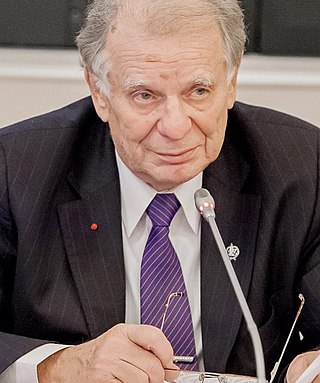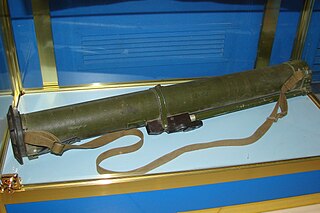Related Research Articles

An intercontinental ballistic missile (ICBM) is a ballistic missile with a range greater than 5,500 kilometres (3,400 mi), primarily designed for nuclear weapons delivery. Conventional, chemical, and biological weapons can also be delivered with varying effectiveness, but have never been deployed on ICBMs. Most modern designs support multiple independently targetable reentry vehicle (MIRVs), allowing a single missile to carry several warheads, each of which can strike a different target. The United States, Russia, China, France, India, the United Kingdom, Israel, and North Korea are the only countries known to have operational ICBMs.

The telecommunications in Russia has undergone significant changes since the 1980s, radio was a major new technology in the 1920s, when the Communists had recently come to power. Soviet authorities realized that the "ham" operator was highly individualistic and encouraged private initiative – too much so for the totalitarian regime. Criminal penalties were imposed but the working solution was to avoid broadcasting over the air. Instead radio programs were transmitted by copper wire, using a hub and spoke system, to loudspeakers in approved listening stations, such as the "Red" corner of a factory. This resulted in thousands of companies licensed to offer communication services today. Due to the enormous size of the country Russia today, the country leads in the number of TV broadcast stations and repeaters. The foundation for liberalization of broadcasting was laid by the decree signed by the President of the USSR in 1990. Telecommunication is mainly regulated through the Federal Law "On Communications" and the Federal Law "On Mass Media"
Telecommunications in Saudi Arabia have evolved early in the Kingdom since the establishment the Directorate of Post, Telephone and Telegraph (PTT) in 1926.

Zhores Ivanovich Alferov was a Soviet and Russian physicist and academic who contributed significantly to the creation of modern heterostructure physics and electronics. He shared the 2000 Nobel Prize in Physics for the development of the semiconductor heterojunction for optoelectronics. He also became a politician in his later life, serving in the lower house of the Russian parliament, the State Duma, as a member of the Communist Party from 1995.
PJSC Aeroflot – Russian Airlines, commonly known as Aeroflot, is the flag carrier and the largest airline of Russia. Aeroflot is headquartered in the Central Administrative Okrug, Moscow, with its hub being Sheremetyevo International Airport. The Federal Agency for State Property Management, an agency of the Government of Russia, owns 73.77% of the company, with the rest of the shares being public float.
Disinformation is false information deliberately spread to deceive people. Disinformation is an orchestrated adversarial activity in which actors employ strategic deceptions and media manipulation tactics to advance political, military, or commercial goals. Disinformation is implemented through attacks that weaponize multiple rhetorical strategies and forms of knowing—including not only falsehoods but also truths, half-truths, and value judgements—to exploit and amplify culture wars and other identity-driven controversies."

The GP-25 Kostyor ("Bonfire"), GP-30 Obuvka ("Shoe") and GP-34 are a family of Russian 40 mm under-barrel muzzleloaded grenade launchers for the AK family of assault rifles. They were first seen by the West in 1984, during the Soviet Invasion of Afghanistan. The GP-30 was lightened and the redesigned sighting system was moved to the right.

The RPG-26 Aglen is a disposable anti-tank rocket-propelled grenade (RPG) launcher developed by the Soviet Union. It fires a one-stage rocket with jack-knife fins, which unfold after launch. The rocket carries a 72.5-millimetre (2.85 in) diameter high-explosive anti-tank (HEAT) single shaped charge warhead able to penetrate 440 millimetres (17 in) of armour, 1 metre of reinforced concrete or 1.5 metres of brickwork. It has a maximum effective range of around 250 metres (820 ft). The similar sized rocket features a slightly heavier and more powerful HEAT warhead and more powerful rocket engine. The limited extension of the RPG-22 launch tube was found of little use. Thus, the RPG-26 has a rigid non-telescoping launch tube.

Ashton Baldwin Carter was an American government official and academic who served as the 25th United States secretary of defense from February 2015 to January 2017. He later served as director of the Belfer Center for Science & International Affairs at Harvard Kennedy School.
Standard Telephones and Cables Ltd was a British manufacturer of telephone, telegraph, radio, telecommunications, and related equipment. During its history, STC invented and developed several groundbreaking new technologies including pulse-code modulation (PCM) and optical fibres.

Blok D is an upper stage used on Soviet and later Russian expendable launch systems, including the N1, Proton-K and Zenit.
South Texas College (STC) is a public community college in the Rio Grande Valley region of South Texas. It is accredited by the Commission on Colleges of the Southern Association of Colleges and Schools to award Bachelor of Applied Technology, Associate of Applied Science, Associate of Arts, and Associate of Science degrees. STC has an enrollment of approximately 31,000 students and a staff of 1,600 working across six campuses. It was created on September 1, 1993, with the passage of Texas Senate Bill 251, the purpose of which was to serve Hidalgo and Starr County.

Internet in Russia, or Russian Internet, and sometimes Runet, is the part of the Internet that is related to Russia. As of 2015, Internet access in Russia is available to businesses and home users in various forms, including dial-up, cable, DSL, FTTH, mobile, wireless and satellite.
The Levada Center is a Russian independent, nongovernmental polling and sociological research organization. It is named after its founder, the first Russian professor of sociology Yuri Levada (1930–2006). The center traces back its history to 1987 when the All-Union Public Opinion Research Center (VTsIOM) was founded under the leadership of academician Tatyana Zaslavskaya. Being one of the largest Russian research companies, the Levada Center regularly conducts its own and commissioned polling and marketing research. In 2016, it was labelled a foreign agent under the 2012 Russian foreign agent law.

India–Russia relations are the bilateral relations and overall international policies between the Republic of India and the Russian Federation. During the Cold War, India and the Soviet Union (USSR) formed a strong and strategic relationship; this diplomatic unity was further strengthened with both nations’ shared military ideals, as well as their overall economic policies. After the dissolution of the Soviet Union, Russia kept the same close ties to India; in international terms, both nations share a special relationship. Russia and India, both, consider their mutual affinity to be a "special and privileged strategic partnership". India and Russia together have aligned interest of creating multipolar world order each being one pole instead of bipolar world with the decline of the American-led unipolar world order.
The Universal Rocket or UR family of missiles and carrier rockets is a Russian, previously Soviet rocket family. Intended to allow the same technology to be used in all Soviet rockets, the UR is produced by the Khrunichev State Research and Production Space Center. Several variants were originally planned, of which only three flew, and only two of which entered service. In addition, the cancelled UR-500 ICBM formed the basis for the Proton carrier rocket.

Baby Steps is a Japanese manga series by Hikaru Katsuki. It was serialized in Kodansha's Weekly Shōnen Magazine from October 2007 to November 2017, with its chapters collected in forty-seven tankōbon volumes. The story is centered on Eiichirō Maruo, a first year honor student who one day decides that he is lacking exercise. He then joins the Southern Tennis Club (STC) where he begins his tennis journey.

The Skolkovo Innovation Center is a high technology business area at Mozhaysky District in Moscow, Russia. Russia's lack of entrepreneurial spirit led to government intervention in patents and the limitation of Russian tech companies within regional operations.

The history of computing in the Soviet Union began in the late 1940s, when the country began to develop its Small Electronic Calculating Machine (MESM) at the Kiev Institute of Electrotechnology in Feofaniya. Initial ideological opposition to cybernetics in the Soviet Union was overcome by a Khrushchev era policy that encouraged computer production.
References
- ↑ Borogan, Andrei Soldatov and Irina. "5 Russian-Made Surveillance Technologies Used in the West". WIRED. Retrieved 2016-10-30.
- ↑ Kovalev, Igor (2016-03-30). "Beware: The Russians are listening". Russia Beyond The Headlines. Retrieved 2016-10-30.